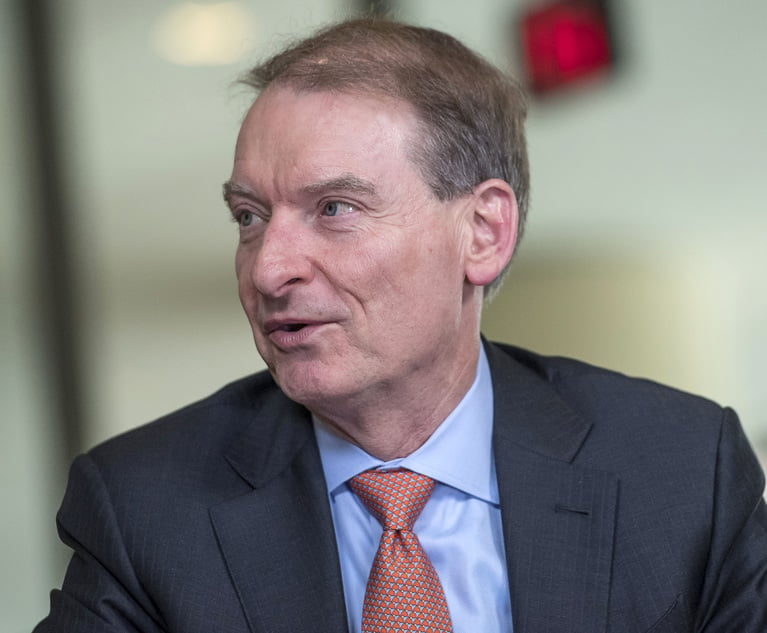 Treasury Secretary Janet Yellen. Credit: Alex Gakos/Shutterstock.com
Treasury Secretary Janet Yellen. Credit: Alex Gakos/Shutterstock.com Wall Street Watchdogs Want More Power to Police Bitcoin
"Innovation without adequate regulation can result in significant disruption and harm to the financial system," Treasury Secretary Janet Yellen said.
October 04, 2022 at 01:05 PM
3 minute read
The top U.S. financial regulators want Congress to give them new powers to directly oversee trading in Bitcoin, the world's largest cryptocurrency.
In a Monday report, the heads of the Federal Reserve, the Treasury and other leading financial watchdogs said the government has limited ability to regulate crypto assets that aren't covered by securities laws. Although many tokens fall under the U.S. Securities and Exchange Commission's rules, some, such as Bitcoin, are not directly under any federal agency's jurisdiction.
"As a result, those markets may not feature robust rules and regulations designed to ensure orderly and transparent trading, to prevent conflicts of interest and market manipulation, and to protect investors and the economy more broadly," the Financial Stability Oversight Council said. FSOC also includes the SEC chair and the head of the Commodity Futures Trading Commission, which is vying for a bigger piece of the crypto regulatory action.
The report is the latest from the Biden administration to call for a more coordinated approach to regulating digital assets after years of patchwork oversight. The SEC claims turf over assets that are considered securities, the CFTC oversees derivatives on crypto and banking regulators also assert some powers.
Congress should also give regulators new powers to weigh in on a range of subjects, including conflicts of interest, abusive trading practices, recordkeeping requirements, segregation of customer assets, and cybersecurity, FSOC said in 100-plus-page report released on Monday. Legislation should also give agencies more enforcement and examination authority, the regulators said.
"Innovation without adequate regulation can result in significant disruption and harm to the financial system," Treasury Secretary Janet Yellen said during the virtual meeting.
There are multiple bills in Congress that would give the CFTC power to oversee Bitcoin and other commodity tokens, but the FSOC report didn't signal its support for any specific legislation. Those measures have the backing of many in industry because they don't want to be regulated by the SEC, which has tough investor-protection requirements.
FSOC also recommended that:
- Agencies assess the impact of plans to give retail customers direct access to digital-asset markets. The CFTC is currently considering a proposal from the U.S. arm of crypto trading giant FTX that would take the middleman out of Bitcoin and Ether futures trading.
- Congress create a regulatory framework for issuer of so-called crypto stablecoins, which are used as an on- and off-ramp to traditional money.
- Lawmakers give regulators power to look at the activities of affiliates and subsidiaries of crypto firms.
- Congress provide agencies with the funding they need to regulate crypto activities.
- Lawmakers give the Federal Housing Finance Agency and the National Credit Union Administration authority to take enforcement action against firms providing crypto-related services to banks.
Allyson Versprille reports for Bloomberg News.
NOT FOR REPRINT
© 2025 ALM Global, LLC, All Rights Reserved. Request academic re-use from www.copyright.com. All other uses, submit a request to [email protected]. For more information visit Asset & Logo Licensing.
You Might Like
View All
Data Breach Lawsuit Against Byte Federal Among 1,500 Targeting Companies in 2024
4 minute read
‘Hawk Tuah Girl’ $440 Million Meme Coin Collapse Sparks Legal Battle
4 minute read
State Attorney General Faces Federal Courtroom Test Over Crypto Mining Ban
4 minute readTrending Stories
- 1Decision of the Day: Uber Cannot Be Held Vicariously Liable for Driver's Alleged Negligent Conduct
- 2TikTok Law and TikTok Politics
- 3California Supreme Court Vacates Murder Conviction in Infant Abuse Case
- 4New York’s Proposed Legislation Restraining Transfer of Real Property
- 5Withers Hires Lawyers, Staff From LA Trusts and Estates Boutique
Who Got The Work
Michael G. Bongiorno, Andrew Scott Dulberg and Elizabeth E. Driscoll from Wilmer Cutler Pickering Hale and Dorr have stepped in to represent Symbotic Inc., an A.I.-enabled technology platform that focuses on increasing supply chain efficiency, and other defendants in a pending shareholder derivative lawsuit. The case, filed Oct. 2 in Massachusetts District Court by the Brown Law Firm on behalf of Stephen Austen, accuses certain officers and directors of misleading investors in regard to Symbotic's potential for margin growth by failing to disclose that the company was not equipped to timely deploy its systems or manage expenses through project delays. The case, assigned to U.S. District Judge Nathaniel M. Gorton, is 1:24-cv-12522, Austen v. Cohen et al.
Who Got The Work
Edmund Polubinski and Marie Killmond of Davis Polk & Wardwell have entered appearances for data platform software development company MongoDB and other defendants in a pending shareholder derivative lawsuit. The action, filed Oct. 7 in New York Southern District Court by the Brown Law Firm, accuses the company's directors and/or officers of falsely expressing confidence in the company’s restructuring of its sales incentive plan and downplaying the severity of decreases in its upfront commitments. The case is 1:24-cv-07594, Roy v. Ittycheria et al.
Who Got The Work
Amy O. Bruchs and Kurt F. Ellison of Michael Best & Friedrich have entered appearances for Epic Systems Corp. in a pending employment discrimination lawsuit. The suit was filed Sept. 7 in Wisconsin Western District Court by Levine Eisberner LLC and Siri & Glimstad on behalf of a project manager who claims that he was wrongfully terminated after applying for a religious exemption to the defendant's COVID-19 vaccine mandate. The case, assigned to U.S. Magistrate Judge Anita Marie Boor, is 3:24-cv-00630, Secker, Nathan v. Epic Systems Corporation.
Who Got The Work
David X. Sullivan, Thomas J. Finn and Gregory A. Hall from McCarter & English have entered appearances for Sunrun Installation Services in a pending civil rights lawsuit. The complaint was filed Sept. 4 in Connecticut District Court by attorney Robert M. Berke on behalf of former employee George Edward Steins, who was arrested and charged with employing an unregistered home improvement salesperson. The complaint alleges that had Sunrun informed the Connecticut Department of Consumer Protection that the plaintiff's employment had ended in 2017 and that he no longer held Sunrun's home improvement contractor license, he would not have been hit with charges, which were dismissed in May 2024. The case, assigned to U.S. District Judge Jeffrey A. Meyer, is 3:24-cv-01423, Steins v. Sunrun, Inc. et al.
Who Got The Work
Greenberg Traurig shareholder Joshua L. Raskin has entered an appearance for boohoo.com UK Ltd. in a pending patent infringement lawsuit. The suit, filed Sept. 3 in Texas Eastern District Court by Rozier Hardt McDonough on behalf of Alto Dynamics, asserts five patents related to an online shopping platform. The case, assigned to U.S. District Judge Rodney Gilstrap, is 2:24-cv-00719, Alto Dynamics, LLC v. boohoo.com UK Limited.
Featured Firms
Law Offices of Gary Martin Hays & Associates, P.C.
(470) 294-1674
Law Offices of Mark E. Salomone
(857) 444-6468
Smith & Hassler
(713) 739-1250







